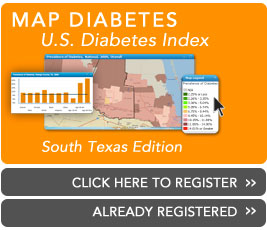Posted by Diabetes South Texas Staff
Clinical Trial News
Saturday, July 5th, 2014
Diabetes Care: July 2014
OBJECTIVE To assess the efficacy of in-shoe orthoses that were designed based on shape and barefoot plantar pressure in reducing the incidence of submetatarsal head plantar ulcers in people with diabetes, peripheral neuropathy, and a history of similar prior ulceration.
RESEARCH DESIGN AND METHODS Single-blinded multicenter randomized controlled trial with subjects randomized to wear shape- and pressure-based orthoses (experimental, n = 66) or standard-of-care A5513 orthoses (control, n = 64). Patients were followed for 15 months, until a study end point (forefoot plantar ulcer or nonulcerative plantar forefoot lesion) or to study termination. Proportional hazards regression was used for analysis. Read more
Posted by Staff
Clinical Trial News
Tuesday, June 24th, 2014
Diabetes Care June 4, 2014
OBJECTIVE Depression is a common comorbidity of diabetes, undesirably affecting patients’ physical and mental functioning. Psychological interventions are effective treatments for depression in the general population as well as in patients with a chronic disease. The aim of this study was to assess the efficacy of individual mindfulness-based cognitive therapy (MBCT) and individual cognitive behavior therapy (CBT) in comparison with a waiting-list control condition for treating depressive symptoms in adults with type 1 or type 2 diabetes. Read More
Posted by Staff
Clinical Trial News
Tuesday, June 24th, 2014
Diabetes Care: June 4, 2014
OBJECTIVE GLP-1 receptor agonists may provide an alternative to prandial insulin for advancing basal insulin therapy. Harmony 6 was a randomized, open-label, active-controlled trial testing once-weekly albiglutide vs thrice-daily prandial insulin lispro as an add-on to titrated once-daily insulin glargine.
RESEARCH DESIGN AND METHODS Patients taking basal insulin (with or without oral agents) with HbA1c 7–10.5% (53–91 mmol/mol) entered a glargine standardization period, followed by randomization to albiglutide, 30 mg weekly (n = 282), subsequently uptitrated to 50 mg, if necessary, or thrice-daily prandial lispro (n= 281) while continuing metformin and/or pioglitazone. Glargine was titrated to fasting plasma glucose of <5.6 mmol/L, and lispro was adjusted based on glucose monitoring. The primary end point was the difference in the HbA1c change from baseline at week 26. Read More
Posted by Staff
Clinical Trial News
Tuesday, June 24th, 2014
Diabetes Care June 2014
OBJECTIVE We examined the effects of an intensive lifestyle intervention (ILI), compared with a diabetes support and education (DSE) control intervention, on long-term changes in depression symptoms, antidepressant medication (ADM) use, and health-related quality of life (HRQoL) in overweight/obese individuals with type 2 diabetes.
RESEARCH DESIGN AND METHODS Look AHEAD was a multisite randomized controlled trial of 5,145 overweight/obese participants assigned to ILI (designed to produce weight loss) or DSE and followed for a median of 9.6 years. The Beck Depression Inventory (BDI) was administered at baseline, annually at years 1–4, and again at year 8. Mean BDI scores and incidence of BDI scores ≥10, indicative of likely mild or greater depression, were examined. Annually through year 10, participants reported their ADM use and completed the Medical Outcomes Study Short Form 36 (SF-36) questionnaire, which yields physical component summary (PCS) and mental component summary (MCS) scores. Read More
Posted by Staff
Clinical Trial News
Tuesday, June 24th, 2014
Springer: June 2014
Aims/hypothesis
The estimation of effect size in clinical trials commonly disregards recurrent outcomes. We investigated the effectiveness of a complex intervention on recurrent outcomes in patients with type 2 diabetes.
Methods
In the Diabetes Care in General Practice (DCGP) randomised controlled trial, 1,381 patients newly diagnosed with type 2 diabetes were randomised to 6 years of structured personal care or routine care (ClinicalTrials.gov NCT01074762). The trial had 19 years of registry-based follow-up and was analysed with Cox regression models. Repeated occurrences in the same patient of outcomes (any diabetes-related endpoint, myocardial infarction [MI], stroke, peripheral vascular disease and microvascular disease) were accounted for with the Wei, Lin and Weissfeld method. Read More
Posted by Staff
Clinical Trial News
Tuesday, June 24th, 2014
Diabetes Care: May 30, 2014
Objective To compare efficacy and safety of dulaglutide, a once weekly glucagon-like peptide1 receptor agonist, to placebo and exenatide in type 2 diabetes patients. Primary objective was superiority of dulaglutide 1.5 mg versus placebo in HbA1cchange at 26 weeks.
Research Design and Methods This 52-week, multicenter, parallel-arm study (primary endpoint: 26 weeks) randomized patients (2:2:2:1) to dulaglutide 1.5 mg, dulaglutide 0.75 mg, exenatide 10 μg, or placebo (placebo-controlled period: 26 weeks). Patients were treated with metformin (1500-3000 mg) and pioglitazone (30-45 mg); mean baseline HbA1c was 8.1% (65 mmol/mol). Read more
Posted by Staff
Clinical Trial News
Tuesday, June 24th, 2014
Diabetes Care May 19, 2014
OBJECTIVE Compare the efficacy and safety of monotherapy with dulaglutide, a once-weekly GLP-1 receptor agonist, to metformin-treated patients with type 2 diabetes. The primary objective compared dulaglutide 1.5 mg and metformin on change from baseline glycosylated hemoglobin A1c (HbA1c) at 26 weeks.
RESEARCH DESIGN AND METHODS This 52-week double-blind study randomized patients to subcutaneous dulaglutide 1.5 mg, dulaglutide 0.75 mg, or metformin. Patients (N = 807) had HbA1c ≥6.5% (≥48 mmol/mol) and ≤9.5% (≤80 mmol/mol) with diet and exercise alone or low-dose oral antihyperglycemic medication (OAM) monotherapy; OAMs were discontinued at beginning of lead-in period. Read More



























